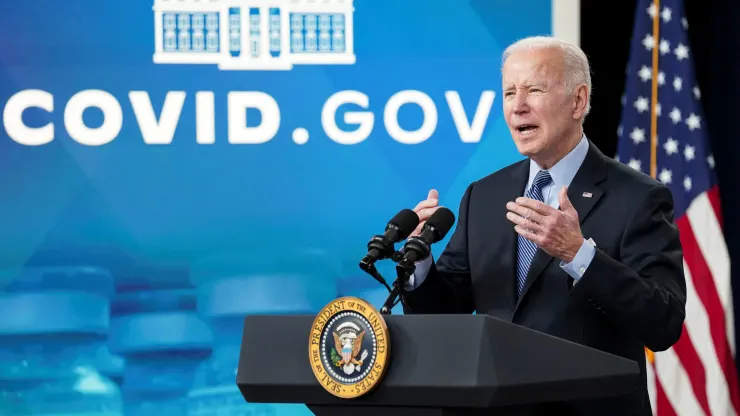Biden administration announces end to Covid-19 Public Health Emergency (PHE)

Photo by CNBC
The emergency declarations related to the Covid -19 pandemic will expire on May 11th, according to the Biden administration.
“The COVID-19 national emergency and public health emergency (PHE) were declared by the Trump Administration in 2020,” the Office of Management and Budget said in a statement. “They are currently set to expire on March 1 and April 11, respectively. At present, the Administration’s plan is to extend the emergency declarations to May 11, and then end both emergencies on that date.”
We all want to keep up with the changes once the PHE is done. Physicians, Hospitals and practices need to know how the removal of the 1135 waiver will affect them.
What is changing? When is it changing?
It is important to note that not everything will just end on May 11th, there are a lot of nuances to the policies that we all need to be aware of.
There were some policies* and flexibilities are set to end on the last day of the year that PHE expires, so on December 31st 2023 the following will be over:
- The increase funding of 6.2% to state Medicaid programs is now set to end on 12/31/2023
- The flexibility to be reimbursed to provide cardiac, intensive cardiac and pulmonary rehab services via telehealth under the physician fee schedule
- Supervision of diagnostic services virtually through audio/video real-time communications
- Equal reimbursement for services performed via telehealth that normally would have been performed in person.
- Additionally, Medicare will continue to pay $40 for COVID-19 vaccines administered in outpatient settings through Dec. 31, 2023.
The following policies* and programs will end on the last day of the PHE, currently set for May 11, 2023.
Blanket waivers and inpatient/outpatient changes
- “Hospital without walls” use, such as vacant building, auditoriums and spaces within the hospital that do not conform to the conditions of participation requirements for patient rooms, such as conference rooms and surgical suites.
- Use of provider-based departments that were relocated to settings outside the hospital, including patients’ homes, after receipt of an extraordinary circumstances waiver and that provide education and therapy services to hospital outpatients.
- Skilled nursing facility (SNF) beds available for patients not meeting SNF requirements.
- EMTALA waiver allowing hospitals to redirect patients from their emergency departments to screening tents for COVID-19 testing.
- Flexibility on limit of 25 beds for Critical Access Hospitals (CAHs) and the 96-hour rule for average length of stay.
- Reduced information requirements for post-acute care discharge to a SNF, rehabilitation center, long-term care hospital or home health agency.
- Flexibility to not have a separate nursing plan of care for each patient.
- Medicare’s 20% add on payments for patients diagnosed with COVID-19 to offset the cost of complex COVID-19 patient care.
- Free COVID-19 at-home tests and no cost sharing for testing services and therapeutics for Medicare beneficiaries (including those in Medicare Advantage plans) and those enrolled in private coverage. After the PHE ends, patient cost sharing will be required except for Medicaid beneficiaries who have at least an additional year of tests and therapeutics access at no cost.
- Health plan requirements to reimburse out-of-network providers for COVID-19 vaccines and testing.
- Permission from the Drug Enforcement Agency to prescribe controlled substances without an in-person visit.
Due to the passing of house bill H.R. 4040 “Advancing Telehealth Beyond COVID-19 Act of 2022” on 07/27/2022 the policies* and flexibilities for telehealth will continue until at least until the December 31st, 2024
- Liability immunity for use of countermeasures for COVID-19 will end Oct. 1, 2024, which is the end of the Public Readiness and Emergency Preparations (PREP) Act declaration.
- Certain telehealth flexibilities that congress extended through Dec. 31, 2024:
- Waiver of geographic and location requirements
- Reimbursement for telehealth services furnished by physical therapists, occupational therapists, speech language pathologists and audiologists
- Reimbursement for audio-only services
- Reimbursement for telehealth services furnished by federally qualified health centers and rural health clinics
- Use of telehealth to recertify eligibility for hospice
- Acute Care Hospital at Home program, which congress extended through Dec. 31, 2024.
- Food and Drug Administration (FDA) emergency use authorizations (EUAs) for drugs and devices do not have a specified ending. The FDA has the authority to extend these EUAs at its discretion to ensure continued availability of effective testing, vaccination and therapeutics. Further information has been requested from the agency, but there is no indication it intends to end any of the EUAs soon.
- Hospital COVID-19 data reporting requirements that were instituted in 2020. The CMS condition of participation (CoP) requiring hospitals and CAHs to submit certain data related to COVID-19 to HHS was originally set to expire at the conclusion of the PHE. However, in the FY 2023 Inpatient Prospective Payment System final rule, CMS revised the CoP to require hospitals to continue reporting COVID-19-related data after the conclusion of the PHE through Apr. 30, 2024, unless the Health and Human Services Secretary establishes an earlier end date.
Additionally, implementation of the in-person visit requirement for initiation of tele-behavioral health services is delayed until the end of 2024.
As changes and updates are made, we in the medical community will have to continue to be flexible and willing to roll with the changes, being mindful and swift to implement the changes as they come along.
A link to the full waiver program, for a comprehensive list of all programs:
https://www.cms.gov/coronavirus-waivers
For a full read of the H.R. 4040 bill please use this link: